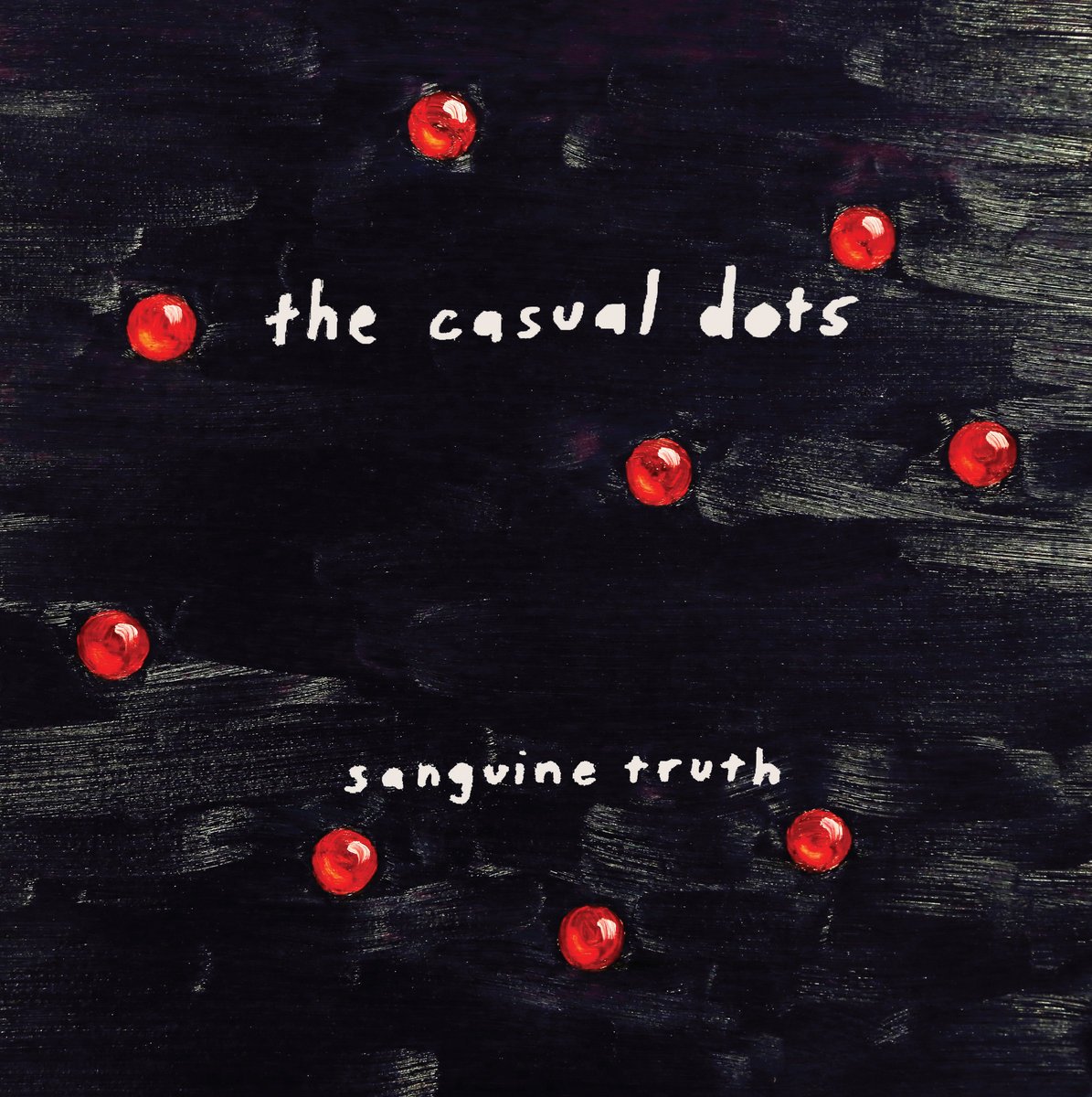by Emma Ingrisani
Sometime in the fall of 2006, a friend sent me a mix CD in the mail. The songs, true to that indie moment, were mostly mild-mannered, twee, and pseudo-folky, but one stood out, striking but unplaceable. Syncopated guitars and drums crashed and clanged as an otherworldly voice enunciated syllable-stacked couplets: “What is love? What’s the definition / Is it real, or just an illusion?” I looked at the paper track listing. Looping purple rollerball read, “Clocks: The Casual Dots.”
The Casual Dots—DIY/riot grrrl veterans Christina Billotte (Autoclave, Slant 6, Quixotic), Kathi Wilcox (Bikini Kill, the Frumpies) and Steve Dore (Deep Lust, Snoozers)—released The Casual Dots in 2004, apparently with little press or self-promotion, but still establishing a fan base through blog-era word-of-mouth and mixes like the one I was given. After an 18-year hiatus, last month the band re-released The Casual Dots at the same time as their surprise second full-length, Sanguine Truth, seeming to invite a revisiting of their debut together with the new one.
Experienced as a kind of double album, The Casual Dots and Sanguine Truth chart a distinctive collection of songs, enjoyably hook-filled and (casually) masterful. They touch on a range of influences, from early ’50s rock to surf to garage to the ’90s scenes the band members emerged from, but channel them into something original and oddly timeless.
Timelessness—really, a sense of dislocation or suspension from time, of lost time, and of the process of spending it—also feels like a loose thematic framework of these two albums. Lyrically, and also through their singular sound, the band subtly registers a perspective that isn’t quite dread, but is at least a heightened, anxious awareness of time’s passing.
The Casual Dots foregrounds this theme with its instrumental opener “Derailing,” pairing a metronome beat with careening guitars: the collision of the bright, agile notes of Billotte’s playing with Wilcox’s muscular, vroomy distortion conveying determined, headlong recklessness. The onslaught is broken at intervals with slow, deliberate chord progressions—an effect repeated mid-album in “Clocks”—that provide a moment of pause or hesitation.
The interplay between Billotte's and Wilcox's guitars is one of the principal pleasures of the album. Another is Billotte’s remarkable singing voice. Clear and sweet, it has a versatility that can evoke a midcentury jazz crooner (“Mama’s Gonna Bake Us A Cake,” covering Etta James’ “I’ll Dry My Tears”) or a New Wave idol (“Hooded,” “Evil Operations Classified”), and can sound ironically detached, philosophical, or deeply, affectingly sad.
With Billotte’s easy delivery, the band's characteristically rhymed lyrics sometimes take on an incantatory quality, notably in “E.S.P. For Now,” as a volley of guitars is garnished with lines both mystical and knowingly absurd: “Extrasensory perception / We can see through your mind's conception,” she announces with chirpy conviction. “She’s The Real Thing” is complicated by the vocals cutting out at key points. “He’s the real thing and you knew it all along,” Billotte sings, addressing one half of a couple. “His mind is quick and agile and his heart is very [. . .].” The space between words and meaning—and their dependence on legibility in the moment—seems under indefinite scrutiny.
With songs purportedly composed at different points in the intervening years, Sanguine Truth opens with the arresting track “The Frequency of Fear,” a rapid beat and tight guitar harmonies supporting Billotte’s brisk vocals. Underscored by the focused instrumentation, the lyrics introduce a tone more urgent than contemplative: “Don’t tune into fear / That frequency’s so clear.” Throughout the album, there’s a shift toward a worldview shaded by some sort of absence or ending, and echoed by a more minor-key, somber sound.
As they contribute to this thematic turn, the album’s arrangements also complicate the dynamic between the guitarists. The songs of The Casual Dots often position the two as counterpoints, either synchronized or theatrically dueling, but Sanguine Truth brings them closer together along with Dore's drums, creating a dense and patterned sonic fabric that’s used to blistering effect in “High Speed Chase” and “The Setting Sunrise.”
Two songs on Sanguine Truth stand out as especially innovative and winning additions. “Gypsum Mortar,” swinging with talky guitar lines, gives a classic storytelling structure a psychedelic spin, the repeated phrase “gypsum mortar” taking on near-cosmic significance, while the stately centerpiece “Descending” unfolds with almost Baroque intricacy and precision. Billotte’s voice, with a little howl to it, conjures a haunting scene of missed connection: “Taking a walk past your house tonight / The air is cold and the moon is high.”
Sanguine Truth also dips back into early rock sounds with the doo-wop-esque “Live For Yourself”: ornamented with backup vocals from Wilcox, the song repurposes the rather brash genre into a soulful tribute to self-protection and respect. The album’s two instrumental tracks, the rollicking “17 Year Old Locust”—escalating into a furious all-out shredfest—and the dreamily meandering “Velvet Fields,” showcase the band in a particularly improvisational mode.
Ultimately, it’s the undercurrent of looseness and play that makes The Casual Dots so special: a sense of musicians absorbed and reveling in their craft, apart from any overt narrative. Holding onto much of the mystery The Casual Dots had in the mid-aughts, Sanguine Truth, in tandem with their debut, proves the band’s ongoing fascination—as an ensemble unto itself.

